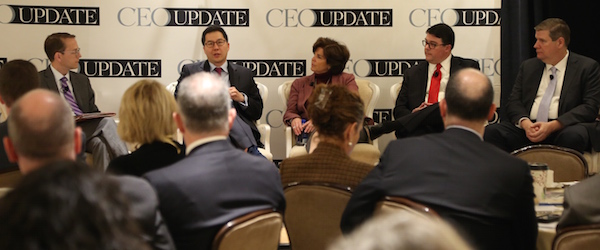CEO Update Live: Forming bonds with recruiters
CEO Update Live: Forming bonds with recruiters
- April 13, 2016 |
-
 CEO Update
CEO Update

 From left, CEO Update Managing Director Mark Graham and recruiters Julian Ha of Heidrick and Struggles, Lorraine Lavet of Korn Ferry, Jim Zaniello of Vetted Solutions and Pat Friel of Lochlin Partners. |
Don't take a transactional or argumentative approach but make a good impression for the long term; opportunities may come later
April 13, 2016
By William Ehart
Top executive recruiters say job candidates should make the most of their meetings with them, build relationships and, importantly, avoid a confrontational attitude when they don't get hired.
"Every interaction is an interview," said Julian Ha, government affairs and trade association practice leader at Heidrick & Struggles.
Ha was among four search consultants participating in a morning panel discussion at the CEO Update Live: Executive Recruiting Forum held April 13 at the Loews Madison hotel in Washington, D.C. More than 90 association executives and others attended.
 Lavet, right, speaks with association executive Maureen Healey. |
The other panelists were Lorraine Lavet, association sector leader at Korn Ferry; Pat Friel, principal at Lochlin Partners, and Jim Zaniello, president and founder of Vetted Solutions. CEO Update Managing Director Mark Graham moderated the event, which also provided job seekers an opportunity to meet the recruiters afterward.
Zaniello said time is precious when given the opportunity to meet a search consultant.
"I'm impressed by somebody who manages that time well, who has their message ready," he said. "What you want me to know about you, who you are, and what you've accomplished as well as where you'd like to go and some of the parameters around that.
"That makes it a lot easier to know when to reach out to you to say we have a search that might be of interest to you. I'm always amazed that such a small percentage of folks follow up and send a thank you note for taking the time.
"Some of the stronger ones actually reiterate the points they would like to make about why I should remember them and when I should remember them," Zaniello said.
Lavet said that candidates should really understand the position and the job description before they apply, and focus on building a lasting relationship with search consultants.
"One of the things I will coach candidates to do is when they look at an opportunity that we are involved with is to really take the time to look at the job description to see if there is in fact a fit," she said.
"Sometimes people will not read that, they have an impression of the organization and feel they automatically should be interviewed; they think they're perfect for it when we know, for whatever reason, they're not.
"I've had people tell me that I'm just wrong, I don't know what my client wants and that's not a good thing to do," Lavet said.
"There are many times that a person can be a perfect fit for something else, but being confrontational and argumentative around a job description or what a client needs is not going to ingratiate them.
"It comes across as desperate, quite frankly," she said. "I can't tell you how often people who come to us who are not a good fit for one thing find themselves within a year or so getting a job somewhere else because we liked them."
Friel agreed.
"Taking that confrontational approach is really a bad strategy," he said. "A candidate might walk out of an interview and call someone who's on the search committee to try to go around us, go around the recruiter, and that's usually a bad strategy as well."
Friel said an aging field of CEOs and increasing board expectations are increasing turnover in the C-suite, creating opportunities and challenges for candidates.
"It's similar to the for-profit world. Boards are more demanding, these jobs are becoming tougher, and you've got less time to make an impact. If you don't, they move on. I see the trend continuing to accelerate," he said.
Ha said expectations are changing: "Especially on the trade association side, what we're seeing is the importance of being front and center as the voice of the industry and the face of the industry," he said. "So the boards of these organizations are expecting different things from their CEOs, more ability to learn and more ability to manage complexity."
Lavet cited learning agility as the most important attribute for a CEO today.
"It's being able to pivot, being able to anticipate what's going on, and not just next week, but what's happening on the horizon," she said.
"What can I see that my individual members can't see? We have to think about how we become relevant and stay relevant with all the changes our members are experiencing."
Zaniello said associations are now looking for leaders who can boost members' bottom lines.
"More often than not they are looking for someone who can grow the industry," he said. "Not grow the association, which 10 or 20 years ago was really important, but grow the industry. How is the association helping me grow my business and my profitability?"
He added that with boards demanding performance and the best leaders being snapped up quickly, short tenures are not necessarily indicative of failure.
"This is like what we saw in 2006 to 2008," he said of the current environment. "If you're really a tried and true performer, boards don't mind if you're only somewhere for 18 months if you had great impact. If you can make the impact we want you to make, we won't mind if you're only here for 18 months."
 More than 90 association executives and others attended the CEO Update Live Executive Recruiting Forum. |
